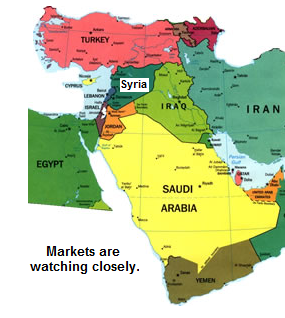Almost everyone has heard the old joke, “Where does an 800 pound Gorilla sleep?” The answer of course is, “Anywhere he wants to”. For most of the last century Saudi Arabia has been the 800 pound gorilla of the oil industry. But recently people have begun wondering whether Saudi Arabia is losing some clout. In today’s article Tsvetana Paraskova of Oilprice.com will look at just where Saudi Arabia stands. ~Tim McMahon, editor
Can Saudi Arabia Still Sway The Oil Market?
 Saudi Arabia, the world’s top oil exporter and OPEC’s largest producer, has influenced the oil market and oil flows since the middle of the 20th century.
Saudi Arabia, the world’s top oil exporter and OPEC’s largest producer, has influenced the oil market and oil flows since the middle of the 20th century.
Shortly after the 21st century began, one of Saudi Arabia’s key customers made its first steps toward becoming one of the Kingdom’s main competitors on the global oil market: the United States began fracking for oil in the mid-2000s. By the end of the 2010s, the U.S. has become the world’s biggest crude oil producer, having surpassed Russia and Saudi Arabia to claim the crown.
Sure, Saudi Arabia is one of the most important factors in global crude trade and oil market participants are lapping up every word and hint from the top oil officials in the Kingdom.
But as the U.S. has started to rely on fewer imported barrels, Saudi Arabia’s power to sway the market has diminished. Another large Saudi customer, China, now has more leverage over Saudi Arabia’s oil flows, Dafna Maor, a columnist for Israeli newspaper Haaretz, writes.
U.S. crude oil imports from all over the world have declined from their peak of 10.126 million bpd in 2005, while imports from Saudi Arabia have also been down in recent years, to average below 1 million bpd in 2017, for the first time since 2009, according to the latest EIA data. Meanwhile, U.S. production is breaking records, despite a slowdown in shale growth in recent months as a result of the 40-percent oil price slump in the fourth quarter of 2018.
In recent years, the Saudis have had stiff competition in what is now the world’s largest oil importing nation, China. In the past three years, Saudi Arabia has lost its status of China’s number-one supplier—to none other than its ally in the OPEC/non-OPEC production cut deal, Russia.
Saudi Arabia is the world’s largest oil exporter, but its dominance over the global oil market has started to crack in recent years. Now the Kingdom influences the market and oil prices as much as (or probably less than) the Permian basin in West Texas does, Haaretz’s Maor argues.
The Saudis don’t want to lose control over OPEC’s oil production policies, which the cartel publicly says are always aimed at a “balanced oil market”, while many OPEC members, including the de facto leader Saudi Arabia, actually need oil prices at least as high as their budget-balance needs. In Saudi Arabia’s case, this is around $80 a barrel Brent Crude or slightly higher.
At the same time, Saudi Arabia claims it wants to diversify its economy away from over-reliance on oil.
As per OPEC figures, the oil and gas sector generates around 50 percent of Saudi Arabia’s gross domestic product (GDP), and accounts for some 70 percent of its export earnings.
The so-called Vision 2030 by Crown Prince Mohammed bin Salman has grand plans about billions upon billions of U.S. dollars in investments into the Saudi economy and renewable energy. Ironically, the Kingdom relies on proceeds from oil, including from the much-hyped but still-on-hold listing of 5 percent in its oil giant Aramco, to fund the transformation.
Yet, until this transformation begins to take place, if at all, Saudi Arabia is aggressively pursuing long-term downstream deals in the world’s fastest-growing oil demand center, Asia, with the goal to lock in future demand for its crude oil.
Aramco has signed in recent months a number of agreements in China to take part in refinery projects. One of the latest deals, buying a 9-percent stake in Zhejiang Petrochemical’s 800,000-bpd integrated refinery and petrochemical complex in Zhoushan, says that “Saudi Aramco’s involvement in the project will come with a long-term crude supply agreement and the ability to utilize Zhejiang Petrochemical’s large crude oil storage facility to serve its customers in the Asian region.”
Despite plans to transform its economy from over-reliance on crude oil and despite gradually losing its dominant position as the single biggest oil price mover, Saudi Arabia is not willing to give up its geopolitical and market power that comes with its current status of the world’s largest oil exporter.
This article originally appeared here and has been reprinted by permission.
You might also like:
- Merger Mania: The World’s Largest Oil Company And Petrochemical Company Merge
- Saudi Arabia: We’ll Pump The World’s Very Last Barrel Of Oil
- U.S. Shale Has A Glaring Problem
- Huge Backlog Could Trigger New Wave Of Shale Oil
